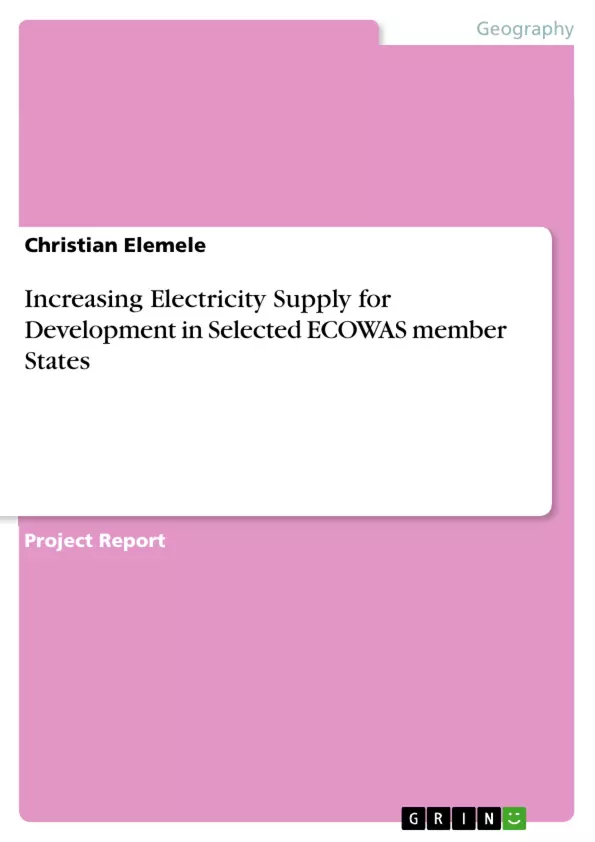The paper will firstly consider the reasons for the widening gap between supply and demand of electricity in Nigeria and the ECOWAS region. Thereafter, the potentials and opportunities in solar and natural gas for increasing power supply in West Africa will be analysed. It should be noted that the data for the West African Pipeline is limited.
The study suggests that the investment in new and improved methods for the generation of electricity is a necessity to ensure sustainability in supply and also eliminate the electricity gap permanently which will result in the overall furtherance in environmental, economic and social aspects. ECOWAS, therefore, provides for solutions that introduce renewable energy solutions to overcome current challenges in off peak generation and Natural Gas for Base Load generation of electricity to stabilise electricity supply so the demand can be met.
Inhaltsverzeichnis (Table of Contents)
- EXECUTIVE SUMMARY
- 1. INTRODUCTION
- 2. WEST AFRICA ENERGY OUTLOOK
- 2.1 Electricity Supply vs Demand in ECOWAS
- 2.2 Current Challenges:
- 2.2.1. Electricity Gap
- 2.2.2 Distribution Value Chain
- 2.3. Impact of Electricity supply on Economic growth.
- 2.3.1 Case Study: Job creation through rehabilitation of the grid in Mozambique
- 3. OPTIONS AND SOLUTIONS FOR ECOWAS MEMBER STATES
- 3.1 Independent Power Producers.........
- 3.2. West African Gas Pipeline........
- 3.2.1. Objective......
- 3.2.2. Challenges...
- 3.2.3. Regional Development in Gas Sector.
- 3.2.4. Opportunity.....
- 3.2.5. Commercial Viability..\li>
- 3.3 West African Solar Corridor
- 3.4 ECOWAS - ECREEE MINI GRID INITIATIVE..
- 3.5 Distributed Energy Sources - Case Study Côte d'Ivoire....
- 4. CONCLUSION AND RECOMMENDATIONS
Zielsetzung und Themenschwerpunkte (Objectives and Key Themes)
This paper aims to analyze the potential and opportunities in solar and natural gas for increased power generation in the ECOWAS region. The primary objective is to address the electricity gap in the region by promoting solutions involving the increase of fossil power generation, renewable energy generation through Solar PV, and the wider use of Off-Grid Power systems for rural electrification.
- The widening electricity gap between supply and demand in the ECOWAS region
- The potential of solar and natural gas for increasing power generation in West Africa
- The opportunities of utility scale solar generation and the need for increased natural gas supply from Nigeria to meet regional electricity demand
- The importance of sustainable electricity supply for development in the ECOWAS region
- The challenges and opportunities associated with utilizing renewable energy sources and natural gas for electricity generation
Zusammenfassung der Kapitel (Chapter Summaries)
- Introduction: This chapter explores the electricity gap in the West African region, highlighting the insufficient power supply to meet growing demand. It emphasizes the limitations of centralized systems and the emergence of IPPs to complement existing power installations. The chapter stresses the need to explore alternative avenues to address the electricity gap, specifically emphasizing the potential of renewable energy sources and increased natural gas utilization.
- West Africa Energy Outlook: This chapter delves into the electricity supply and demand dynamics in ECOWAS member states. It examines the existing electricity gap and discusses the challenges in the distribution value chain, particularly the lack of gas, rising debt from unpaid electricity bills, and outdated transmission networks. The chapter also explores the impact of electricity supply on economic growth through a case study in Mozambique.
- Options and Solutions for ECOWAS Member States: This chapter presents various options and solutions for increasing electricity supply in ECOWAS member states. It discusses the role of independent power producers (IPPs) and the potential of the West African Gas Pipeline (WAGPC). The chapter explores the objectives, challenges, regional development opportunities, and commercial viability of the WAGPC. It also introduces the West African Solar Corridor initiative and the ECOWAS-ECREEE Mini Grid initiative, emphasizing distributed energy sources as seen in a case study of Côte d'Ivoire.
Schlüsselwörter (Keywords)
Key terms and concepts explored in this research include: electricity gap, renewable energy, solar PV, natural gas, West African Gas Pipeline (WAGPC), West African Solar Corridor, Off-Grid Power systems, ECOWAS, and sustainable development.
- Arbeit zitieren
- Christian Elemele (Autor:in), 2018, Increasing Electricity Supply for Development in Selected ECOWAS member States, München, GRIN Verlag, https://www.hausarbeiten.de/document/441756


